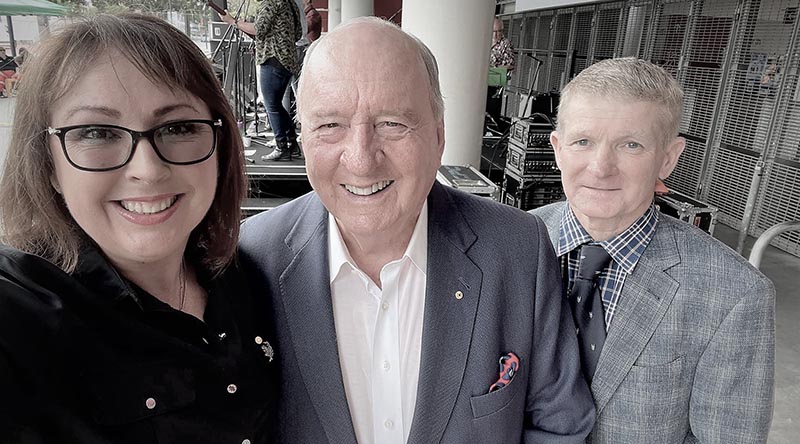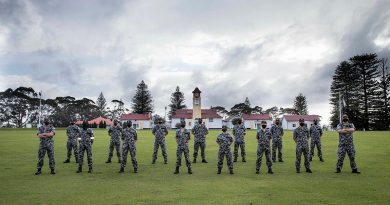Stand tall for ADF PTS reform

The following is a keynote address given by Dr Kay Danes at the launch of a ‘Stand Tall for PTS’ campaign at Suncorp Stadium, Brisbane, on 4 January 2021.
Dr Kay Danes is the spouse of a 42-year ADF/Special Air Service Regiment veteran WO1 (Retd) Kerry Danes, and is passionate about fighting for the rights of ADF members.
.
CAPTION: Kay Danes with fellow speaker Alan Jones and her husband, former SAS Warrant Officer Kerry Danes. Photo supplied.
.
.
From the research we know that suicide is the second leading cause of death among serving Australian Defence Force members, and the leading cause of death among veterans. ADF members who are medically discharged are more likely to suicide than those who discharge voluntarily.
Hundreds of Redress of Grievance (ROG) complaints are submitted each year by ADF members to their service chiefs, representing grievances associated with professional employment failures. Sometimes, but not always, they are escalated to a Defence Inquiry.
We have put combat-related mental illness at the epicentre of ADF member and veteran suicide for far too long. In doing so, we have overlooked the impact that failed administrative policies have on our serving ADF members.
Reforms to the ROG and Defence inquiry processes are urgently needed because in their current format they are seriously flawed, and often result in significant mental trauma and reputational harm to the complainant.
It is abundantly clear to those serving ADF members who have experienced either of these processes that they are mechanisms by which the ADF uses the full weight of its resources – human, legal and financial – to minimise liability and reputational harm to itself. The outcomes are most always in favour of the ADF.
As a consequence, the ADF member feels they have been exposed to an injustice, whether real or perceived, and this causes them serious distress and which puts them at an increased risk of suicide and self-harm.
And it is not difficult to understand why the ADF member may feel there has been an injustice because a Defence inquiry process is not bound by rules of evidence or legal technicalities. Witnesses can provide false testimony and do.
Anything they say is protected by legal privilege, which means it cannot be disclosed in civil proceedings, even where defamation has occurred. Inquiry officers are not constrained by the fundamental concepts of justice and equality. Most are not legally trained and many have only ever undertaken four days of non-mandatory training in how to conduct an inquiry.
These processes are supposed to be timely…but many cases drag on for years because of the adversarial approach Defence usually takes when dealing with complaints.
This prolongs the mental trauma to the ADF member. Their anxiety is compounded by the fact that they feel victimised. Those who succeed in arguing their case, find their situation unchanged because too much time has passed to put in place corrective action. And, in actual fact, there is no policy in place for corrective action.
Of course, ADF members can take their complaint outside of the chain of command to the IGADF [1], the Defence Ombudsman, and even the Human Rights Commissioner. However, these officials invariably default to the Defence decision. And that happens, even when it can be substantiated that investigating officers have failed to uphold Defence policy and common law.
Suicidal acts and self-harm usually come from hopelessness and injustice.
This is not to suggest that every failed attempt to right an injustice through the chain of command will result in suicide. Still, so many of our ADF members who have complaints before the service chiefs are pushed to the very edge of their emotional endurance. And let us not forget that they are fighting their perceived injustice from within the workplace.
Suppose we do not accept that something has to change in order for ADF members to resolve their grievances through genuine mediation, and fix these processes that are currently failing to protect them from feeling like they are being victimised.
In that case, it is likely those ADF members will carry unresolved grievances into life beyond service. This will impact our efforts to realistically reduce the number of suicides currently plaguing our veteran community.
After all, whenever treating a wound, one must attend the root cause. One simply cannot apply a dressing and expect the wound to heal.
Policy reforms begin with:
- A change to the Defence (Inquiry) Regulations so that the rules of evidence form the basis of all Inquiries, and provide a fair and transparent process to ensure complainants are able to assert their rights under equal opportunity law, and that the hearing of their complaint adheres to the principle of open justice and common law,
- Defence Inquiry officers should be legally trained,
- Witnesses should be required to give evidence under oath or affirmation, and anyone who gives misleading or false information should be held accountable,
- Where any complaint is not resolved during service, then there must be an appeal mechanism, fully free from Defence influence, to assess the fairness of the decision, and
- Finally, and most importantly, the implementation of a corrective action policy.
Now is the time to stand tall for the thousands of men and women who have worn their uniform in service to our nation and, particularly, for those who still wear it.
Together we must be bold in our endeavours to encourage much-needed policy reforms, so at the very least, our serving members may have realistic opportunities to resolve their complaint in the workplace; secure corrective action to reduce their exposure to suicide risk and self-harm, and to restore their dignity and professional reputation.
This is not an overwhelming task. It does not require an influx of financial resources. It merely requires the will to recognise that policy reforms are needed, and courage for those in positions of power to take a step forward.
Footnote:
[1] IGADF – Inspector General ADF – is a statutory appointment outside the chain of command who [in theory] independently monitors and assesses the health and effectiveness of the military justice system. The IGADF was established to provide an avenue by which failures of military justice may be exposed, examined and any injustice remedied. Unfortunately it rarely happens because there is no corrective policy in the ADF. Hence the necessity for a Royal Commission and to create an independent forum for genuine workplace mediation that is accessible to all ADF personnel, and to create opportunities for early interventions, in response to professional employment failures.
More information at www.defencelivesmatter.com
.
.
.
.
.
.

.
.






